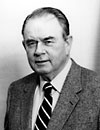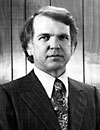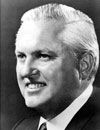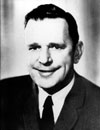Oklahoma
Gov. Martin Edwin Trapp
- November 19, 1923 - January 10, 1927
- Democratic
- April 18, 1877
- July 26, 1951
- Kansas
- Capitol City College (Oklahoma)
- Married Lula C. Strang; one child
- Succeeded
About
Born in Robinson, Kansas, MARTIN EDWIN TRAPP moved to Oklahoma Territory as a teenager. He was educated in the public schools and graduated from Capitol City College in Guthrie, Oklahoma in 1898. He studied law privately and was admitted to the Oklahoma Bar. He was elected Logan County Clerk, serving from 1905 to 1906; State Auditor, serving from 1907 to 1911; and Lieutenant Governor, serving from 1914 until October 23, 1923, when he took over as acting governor pursuant to the leveling of impeachment charges against Governor Jack Walton, who was ultimately convicted and removed from office. One of Trapp’s first acts as governor was to convene a special session of the legislature to make fiscal adjustments in order to raise additional revenue while economizing expenses. During his administration, the state gasoline tax was raised and used to finance extensive highway reconstruction. Trapp acted to remove the State School Land Commission from political administration, secured legislation to create the Flood Control Administration, and reorganized the penal system to enable the manufacturing of goods by prisoners. In addition, the Forestry Commission, Conservation Commission, Fish and Game Commission, and State Bureau of Criminal Investigation were created during Trapp’s governorship. To reduce the power of the Ku Klux Klan, whose activity had risen during the post-World War I depression, an anti-mask law was enacted during Trapp’s administration. Because of the unprecedented way in which Trapp had taken office, there was a question as to whether he was eligible to run for election in his own right in 1926, given the state Constitution’s prohibition against a governor serving successive terms. The question was settled when the Oklahoma Supreme Court ruled that he was indeed governor—not acting governor—forcing him to leave office after the term originally won by Jack Walton expired. Trapp went on to lose the Democratic gubernatorial primary four years later and began a new career as a dealer in investment securities.
Source
Oklahoma Governors Since Statehood
The National Cyclopaedia of American Biography, Vol. G. New York: James T. White & Company.
Sobel, Robert, and John Raimo, eds. Biographical Directory of the Governors of the United States, 1789-1978, Vol. 3. Westport, CT: Meckler Books, 1978. 4 vols.











